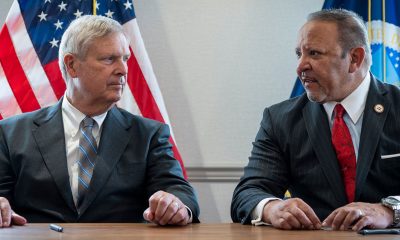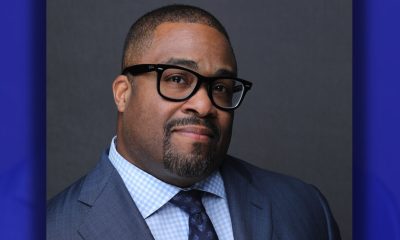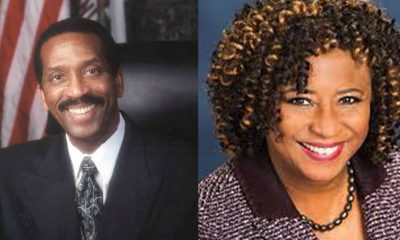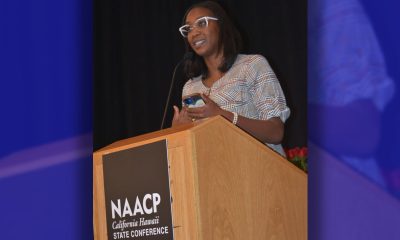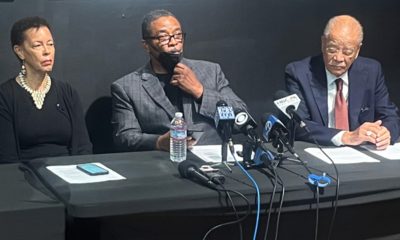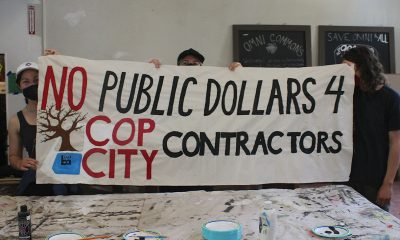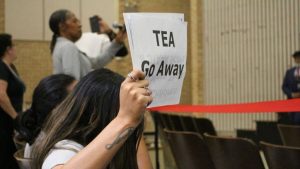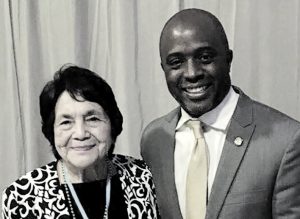Politics
Broader Hiring Practices for Ex-Offenders Receive Bipartisan Support
By Freddie Allen
Senior Washington Correspondent
WASHINGTON (NNPA) – As the economy recovers and violent crime hits 30-year lows, lawmakers continue to trade in their tough on crime rhetoric for smarter measures, joining ex-offenders and workers rights advocates to advance fair hiring practices for the 70 million adults in the U.S. that have arrests or conviction records.
Recently, a diverse coalition of 181 groups wrote a letter to President Barack Obama urging him to take executive action to address discrimination in hiring practices.
The group was led by the National Employment Law Project (NELP), a non-partisan group that researches issues affecting low-wage and unemployed workers, All of Us or None, an organizing initiative started by formerly-incarcerated people to fight against discrimination faced by ex-offenders after their release, and the People Improving Communities through Organizing (PICO) Network, a collective of faith-based community organizations.
“Almost one in three adults in the United States has a record that will show up on a routine criminal background check,” the letter said. “This creates a serious barrier to employment for millions of workers, especially in communities of color hardest hit by decades of over-criminalization.”
According to The Sentencing Project, a research and training group that promotes criminal justice reform, even though Blacks account for about 13 percent of the U.S. population, almost 40 percent of people in state or federal prison were Black compared to 35 percent who were White. Black males have a 32 percent chance of serving time in prison and White males have a 6 percent chance.
Not only are African American men over-represented in the criminal justice system, they are also disparately impacted by discrimination in labor market, if they are convicted of a crime.
The January 2015 NELP report on fair hiring practices called those convictions a “modern scarlet letter” that have negatively impacted communities of color devastated by the “War on Drugs” and suffer higher rates of unemployment compared to Whites.
The report also noted that African-American men with a conviction are 40 percent less likely than whites with a conviction to receive a job callback.
In the press release about the groups letter, Wade Henderson, president and CEO of The Leadership Conference on Civil and Human Rights, a coalition of more than 200 national rights groups stated, “Decades of over-criminalization have disproportionately harmed communities of color, leaving millions of Americans with lifelong barriers to economic security.”
The unemployment rate for Black men over 20 years old was 10.4 percent in February was more than double the jobless rate for White men (4.5 percent).
That economic insecurity doesn’t just linger in those communities of color, the damage has a ripple effect, spreading across the nation.
“Economists estimated that because people with felony records and formerly incarcerated people have poor job prospects, the nation’s gross domestic product in 2008 was between $57 and $65 billion lower than it would have been had they been gainfully employed,” stated the NELP report.
A 2013 NELP report found that 17 million FBI checks were conducted for employment screening purposes in 2012, but half of those records lacked updated information. Despite the high-level of inaccuracy, nine in 10 employers still conduct criminal background checks.
The NELP report on fair hiring recommended that President Obama issue a Fair Chance Hiring executive order “that incorporates the best practices implemented by private- and public-sector employers,” and also requires federal contractors to remove the criminal history question from the application and delaying the background check until the company offers the applicant the job.
“A federal-level fair-chance hiring policy would have far-reaching impact, as nearly one in four U.S. workers is employed by a federal contractor, a subcontractor, or the federal government. Major national corporations, such as Walmart, Target, and Home Depot, have already adopted fair-chance hiring policies. President Obama’s My Brother’s Keeper Task Force also endorsed fair-chance hiring policies,” stated the press release.
The report said that the number of jurisdictions that have adopted “fair-chance” reforms is jumped from 20 in 2013 to 42 in 2014.
“Senators Corey Booker (D-NJ) and Rand Paul (R-KY) have introduced the REDEEM Act (S. 2567), which allows for the sealing and expungement of a range of federal juvenile and non-violent offenses, while also addressing the flaws in the FBI’s criminal records systems,” stated the report. “Congressmembers Bobby Scott (D-VA) and Keith Ellison (D-MN) have introduced companion bills (H.R. 2865/H.R. 2999) to improve the integrity of the FBI background checks conducted for employment screening purposes.”
During a recent conversation with David Simon, the creator of “The Wire,” President Obama said that even though the economy is recovering and unemployment is coming down drastically, low participation rates in the labor market continue to be a concern.
“When you breakdown why people are not getting back into the labor force even as jobs are being created a big chunk of that is the young male population with felony histories,” said President Obama. “Now where we have the opportunity to give them a pathway, they’re foreclosed.”
President Obama continued: “Here’s the good news: there is an increasing realization on the left, but also on the right, politically, that what we’re doing is counterproductive. Either from a libertarian perspective, the way we treat non-violent drug crimes is problematic, and from a fiscal perspective, it’s breaking the bank. You end up spending so much more on prison than you would with these kids being in school or even going to college, it’s counterproductive. We’re all responsible for finding a solution to this.”
###
Alameda County
Board of Supervisors Accepts Certification of Signatures, Will Schedule Recall Election May 14
The Alameda Board of Supervisors unanimously accepted the certification of the results of the valid signatures submitted for the recall of District Attorney Pamela Price on Tuesday evening. The Board will set the election date at a special meeting on May 14. Before the meeting, recall proponents and opponents held separate press conferences to plead their cases to the Board and residents of Alameda County.
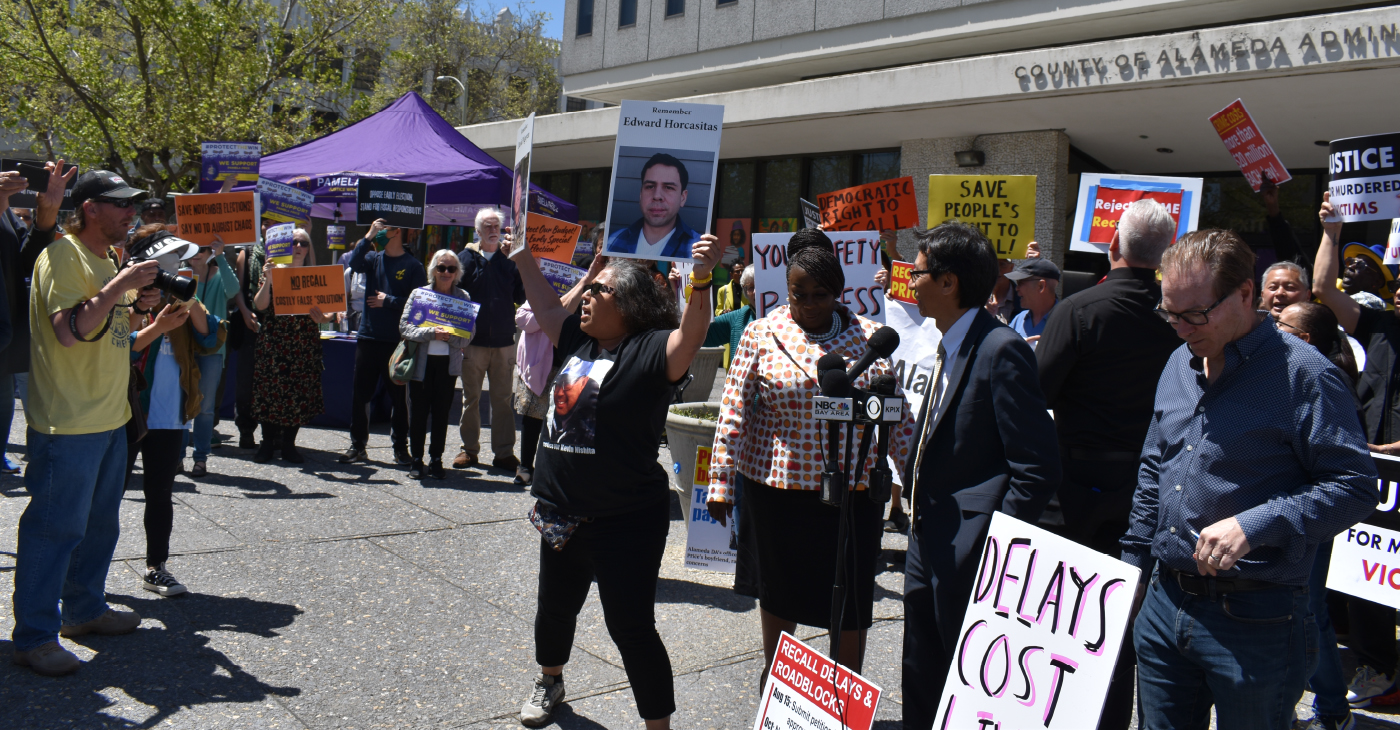
By Magaly Muñoz
The Alameda Board of Supervisors unanimously accepted the certification of the results of the valid signatures submitted for the recall of District Attorney Pamela Price on Tuesday evening. The Board will set the election date at a special meeting on May 14.
Before the meeting, recall proponents and opponents held separate press conferences to plead their cases to the Board and residents of Alameda County.
Price, who up until this point has made little public comment about the recall, held her press conference in Jack London to announce that the California Fair Political Practices Commission has opened an investigation into the finances of the Save Alameda For Everyone (SAFE) recall campaign.
The political action committee (PAC), Reviving the Bay Area, has been the largest contributor to the SAFE organization and has allegedly donated over half a million dollars to the recall efforts.
“Between September 2023 and November 2023, [Revive the Bay Area] donated approximately $578,000 to SAFE without complying with the laws that govern all political committees in California,” Price said.
Price accused the recall campaigns of using irregular signature-gathering processes, such as paying gatherers per signature, and using misleading information to get people to sign their petitions.
SAFE held their own press conference outside of the Alameda County Administration Building at 1221 Oak St. in Oakland, once again calling for the Board to certify their signatures and set a date for the recall election.
Their press conference turned contentious quickly as Price’s “Protect the Win” supporters attempted to yell over the SAFE staff and volunteers. “Stop scapegoating Price” and “Recall Price” chants went on for several moments at a time during this event.
Families of victims urged the Board to think of their loved ones whose lives are worth much more than the millions of dollars that many opponents of the recall say is too much to spend on a special election.
The Registrar of Voters (ROV) estimates the special election could cost anywhere from $15 to $20 million, an amount that is not in their budget.
The Board was presented with several options on when and how to conduct the recall election. They have to set a date no less than 88 days or more than 125 days after May 14, meaning the date could fall anywhere from late July to September.
But the County charter also states that if a general election takes place within 180 days of their scheduling deadline, the Board could choose to use the November ballot as a way to consolidate the two events.
In the event that Price is recalled, the Supervisors would appoint someone to fill the vacancy, though neither the County nor the California charter specifies how long they would have to pick a replacement.
The appointee would serve as district attorney spot until the next election in 2026. Afterwards, either they, if they run and win, or a newly elected candidate would serve the rest of Price’s six-year term until 2029. Price is unique as the only district attorney wo serves a term of six years.
The Board acknowledged that they knew last fall that this recall would come with its own set of complications when Measure B, which changed the local recall charter to match California’s, was first brought to their consideration.
Supervisors Nate Miley and David Haubert opposed discussing the measure, stating that the public would think that the Board was attempting to influence the recall campaign that had already taken off months prior.
“I think ultimately this feels like it’s going to end up in court, one way or the other, depending on who files what,” Haubert said.
Price’s legal team told the Post that the district attorney intended to consider all legal options should the recall election take place.
Miley stated that while he was in support of the amendment to the charter, he did not think it was right to schedule it for the March ballot as it would ultimately cause confusion for everyone involved.
“It has produced some legal entanglements that I think, potentially, could’ve been avoided,” Miley said.
Commentary
Opinion: Lessons for Current Student Protesters From a San Francisco State Strike Veteran
How the nation’s first College of Ethnic studies came about, bringing together Latino, African American and Asian American disciplines may offer some clues as to how to ease the current turmoil on American college campuses over the Israel-Hamas war. After the deadline passed to end the Columbia University encampment by 2 p.m. Monday, student protesters blockaded and occupied Hamilton Hall in a symbolic move early Tuesday morning. Protesters did the same in 1968.

By Emil Guillermo
How the nation’s first College of Ethnic studies came about, bringing together Latino, African American and Asian American disciplines may offer some clues as to how to ease the current turmoil on American college campuses over the Israel-Hamas war.
After the deadline passed to end the Columbia University encampment by 2 p.m. Monday, student protesters blockaded and occupied Hamilton Hall in a symbolic move early Tuesday morning.
Protesters did the same in 1968.
That made me think of San Francisco State University, 1968.
The news was filled with call backs to practically every student protest in the past six decades as arrests mounted into hundreds on nearly two dozen campuses around the country.
In 1970, the protests at Kent State were over the Vietnam War. Ohio National Guardsmen came in, opened fire, and killed four students.
Less than two weeks later that year, civil rights activists outside a dormitory at Jackson State were confronted by armed police. Two African American students were killed, twelve injured.
But again, I didn’t hear anyone mention San Francisco State University, 1968.
That protest addressed all the issues of the day and more. The student strike at SFSU was against the Vietnam war.
That final goal was eventually achieved, but there was violence, sparked mostly by “outside agitators,” who were confronted by police.
“People used the term ‘off the pigs’ but it was more rally rhetoric than a call to action (to actually kill police),” said Daniel Phil Gonzales, who was one of the strikers in 1968.
Gonzales, known as the go-to resource among Filipino American scholars for decades, went on to teach at what was the positive outcome of the strike, San Francisco State University’s College of Ethnic Studies. It’s believed to be the first of its kind in the nation. Gonzales recently retired after more than 50 years as professor.
As for today’s protests, Gonzales is dismayed that the students have constantly dealt with charges of antisemitism.
“It stymies conversation and encourages further polarization and the possibility of violent confrontation,” he said. “You’re going to be labeled pro-Hamas or pro-terrorist.”
That’s happening now. But we forget we are dealing not with Hamas proxies. We are dealing with students.
Gonzales said that was a key lesson at SF State’s strike. The main coalition driving the strike was aided by self-policing from inside of the movement. “That’s very difficult to maintain. Once you start this kind of activity, you don’t know who’s going to join,” he said.
Gonzales believes that in the current situation, there is a patch of humanity, common ground, where one can be both pro-Palestine and pro-Israel. He said it’s made difficult if you stand against the belligerent policies of Benjamin Netanyahu. In that case, you’re likely to be labeled antisemitic.
Despite that, Gonzales is in solidarity with the protesters and the people of Gaza, generally. Not Hamas. And he sees how most of the young people protesting are in shock at what he called the “duration of the absolute inhumane kind of persecution and prosecution of the Palestinians carried out by the Israeli government.”
As a survivor of campus protest decades ago, Gonzales offered some advice to the student protesters of 2024.
“You have to have a definable goal, but right now the path to that goal is unclear,” he said.
About the Author
Emil Guillermo is a journalist and commentator. A veteran newsman in TV and print, he is a former host of NPR’s “All Things Considered.”
Community
Gov. Newsom, Attorney General Bonta Back Bill to Allow California to Host Arizona Abortion Care
Gov. Gavin Newsom and Attorney General Rob Bonta announced last week that they are backing a bill introduced by the state legislative women’s caucus that would allow Arizona-based doctors to provide abortion care in California to patients from Arizona. Senate Bill (SB) 233 was authored in response to the Arizona Supreme Court’s decision on April 9 that an 1864 ban on abortion in the state is enforceable.
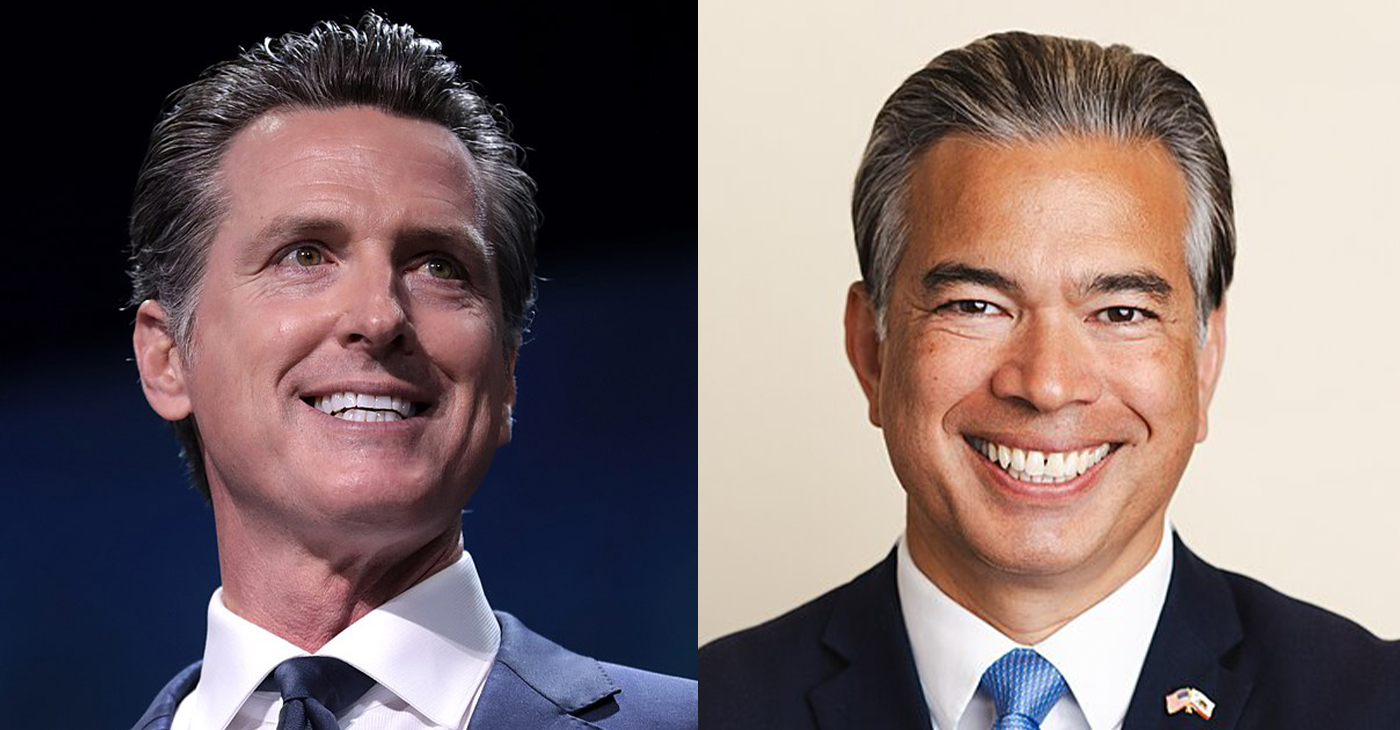
By California Black Media
Gov. Gavin Newsom and Attorney General Rob Bonta announced last week that they are backing a bill introduced by the state legislative women’s caucus that would allow Arizona-based doctors to provide abortion care in California to patients from Arizona.
Senate Bill (SB) 233 was authored in response to the Arizona Supreme Court’s decision on April 9 that an 1864 ban on abortion in the state is enforceable. The bill also aims to counter growing support for anti-abortion legislation in states with Republican-majority legislatures since Roe v. Wade was overturned, according to supporters.
“California will not sit idly by. We’re urgently moving legislation to allow Arizona doctors to provide safe and reliable reproductive care to Arizonans here in California,” Newsom said.
Sen. Nancy Skinner (D-Berkeley), chair of the California Legislative Women’s Caucus said that abortion bans are based on laws that set women back to a time when they had limited human rights.
“Anti-abortion forces have resurrected a dead law passed at a time when women couldn’t vote and husbands beating their wives was lawful,” Skinner said.
On April 24, the Arizona House of Representatives voted to repeal the 1864 abortion ban. It now moves to the Arizona Senate for deliberation.
-

 Community2 weeks ago
Community2 weeks agoFinancial Assistance Bill for Descendants of Enslaved Persons to Help Them Purchase, Own, or Maintain a Home
-

 Activism4 weeks ago
Activism4 weeks agoOakland Post: Week of April 3 – 6, 2024
-

 Business3 weeks ago
Business3 weeks agoV.P. Kamala Harris: Americans With Criminal Records Will Soon Be Eligible for SBA Loans
-

 Activism3 weeks ago
Activism3 weeks agoOakland Post: Week of April 10 – 16, 2024
-

 Community3 weeks ago
Community3 weeks agoAG Bonta Says Oakland School Leaders Should Comply with State Laws to Avoid ‘Disparate Harm’ When Closing or Merging Schools
-

 Community2 weeks ago
Community2 weeks agoOakland WNBA Player to be Inducted Into Hall of Fame
-

 Community2 weeks ago
Community2 weeks agoRichmond Nonprofit Helps Ex-Felons Get Back on Their Feet
-

 Community2 weeks ago
Community2 weeks agoRPAL to Rename Technology Center for Retired Police Captain Arthur Lee Johnson


